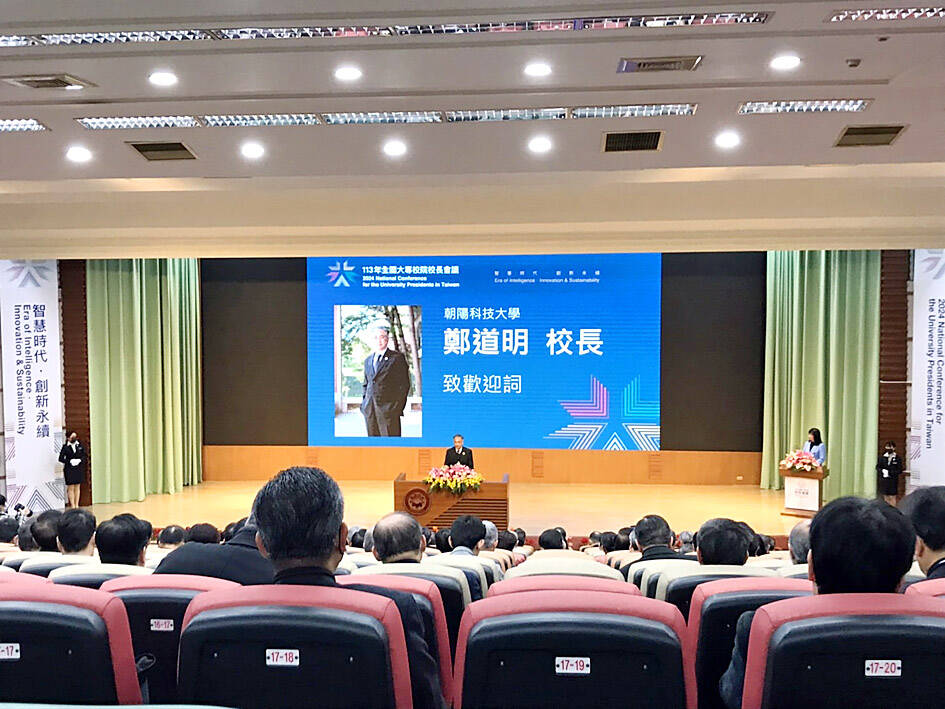A total of 116 academia-industry collaboration programs that could enroll up to 2,120 international students are to be added across Taiwan, with scholarship opportunities and visa assistance available, the Ministry of Education said yesterday.
Department of Technological and Vocational Education Director Yang Yu-hui (楊玉惠) gave a briefing on the ministry’s policy at the annual National Conference for University Presidents.
Universities would add 58 new programs, as would vocational schools, with 93 to be in science, technology, engineering and mathematics, while 15 are to focus on semiconductors and eight are to be in finance, Yang said.

Photo: Yang Mien-chieh, Taipei Times
In addition, recruitment bases are to be set up in the Philippines, Vietnam and Indonesia by the end of this month, she said.
Taiwan is expected to lose its demographic dividend by 2028, so to achieve an average of 3 percent annual population growth, the nation needs to attract 400,000 immigrants by 2030, she said.
International students in Taiwan are more familiar with the nation and have benefited from its education resources, she said, adding that they could be seen as potential economic migrants and efforts to retain them should be prioritized.
Such efforts include encouraging schools to establish international student divisions, providing basic Mandarin courses, expanding on existing academia-industry collaboration programs and relaxing regulations for international students working in Taiwan, she said.
The ministry is encouraging schools to collaborate with businesses to establish new programs, she said.
The Executive Yuan’s National Development Fund (國發基金) is to provide scholarship funds, while companies are expected to provide subsidies to help with living expenses, she said.
The National Development Council is to mull policies to allow international students to count their time studying in Taiwan toward total duration of stay should they wish to apply for an Alien Permanent Resident Certificate.
International students who receive scholarships would have additional “points” and they would no longer have to file for a work visa under the points system, she said, adding that their applications would be processed directly by the Ministry of Labor.
The points system, or New Scoring Criteria, is implemented by the Ministry of Labor to gauge whether an individual is eligible to work in Taiwan. International students must obtain 70 points out of 190 to be eligible for a work visa.

CLASH OF WORDS: While China’s foreign minister insisted the US play a constructive role with China, Rubio stressed Washington’s commitment to its allies in the region The Ministry of Foreign Affairs (MOFA) yesterday affirmed and welcomed US Secretary of State Marco Rubio statements expressing the US’ “serious concern over China’s coercive actions against Taiwan” and aggressive behavior in the South China Sea, in a telephone call with his Chinese counterpart. The ministry in a news release yesterday also said that the Chinese Ministry of Foreign Affairs had stated many fallacies about Taiwan in the call. “We solemnly emphasize again that our country and the People’s Republic of China are not subordinate to each other, and it has been an objective fact for a long time, as well as

‘CHARM OFFENSIVE’: Beijing has been sending senior Chinese officials to Okinawa as part of efforts to influence public opinion against the US, the ‘Telegraph’ reported Beijing is believed to be sowing divisions in Japan’s Okinawa Prefecture to better facilitate an invasion of Taiwan, British newspaper the Telegraph reported on Saturday. Less than 750km from Taiwan, Okinawa hosts nearly 30,000 US troops who would likely “play a pivotal role should Beijing order the invasion of Taiwan,” it wrote. To prevent US intervention in an invasion, China is carrying out a “silent invasion” of Okinawa by stoking the flames of discontent among locals toward the US presence in the prefecture, it said. Beijing is also allegedly funding separatists in the region, including Chosuke Yara, the head of the Ryukyu Independence

UNITED: The premier said Trump’s tariff comments provided a great opportunity for the private and public sectors to come together to maintain the nation’s chip advantage The government is considering ways to assist the nation’s semiconductor industry or hosting collaborative projects with the private sector after US President Donald Trump threatened to impose a 100 percent tariff on chips exported to the US, Premier Cho Jung-tai (卓榮泰) said yesterday. Trump on Monday told Republican members of the US Congress about plans to impose sweeping tariffs on semiconductors, steel, aluminum, copper and pharmaceuticals “in the very near future.” “It’s time for the United States to return to the system that made us richer and more powerful than ever before,” Trump said at the Republican Issues Conference in Miami, Florida. “They

GOLDEN OPPORTUNITY: Taiwan must capitalize on the shock waves DeepSeek has sent through US markets to show it is a tech partner of Washington, a researcher said China’s reported breakthrough in artificial intelligence (AI) would prompt the US to seek a stronger alliance with Taiwan and Japan to secure its technological superiority, a Taiwanese researcher said yesterday. The launch of low-cost AI model DeepSeek (深度求索) on Monday sent US tech stocks tumbling, with chipmaker Nvidia Corp losing 16 percent of its value and the NASDAQ falling 612.46 points, or 3.07 percent, to close at 19,341.84 points. On the same day, the Philadelphia Stock Exchange Semiconductor Sector index dropped 488.7 points, or 9.15 percent, to close at 4,853.24 points. The launch of the Chinese chatbot proves that a competitor can